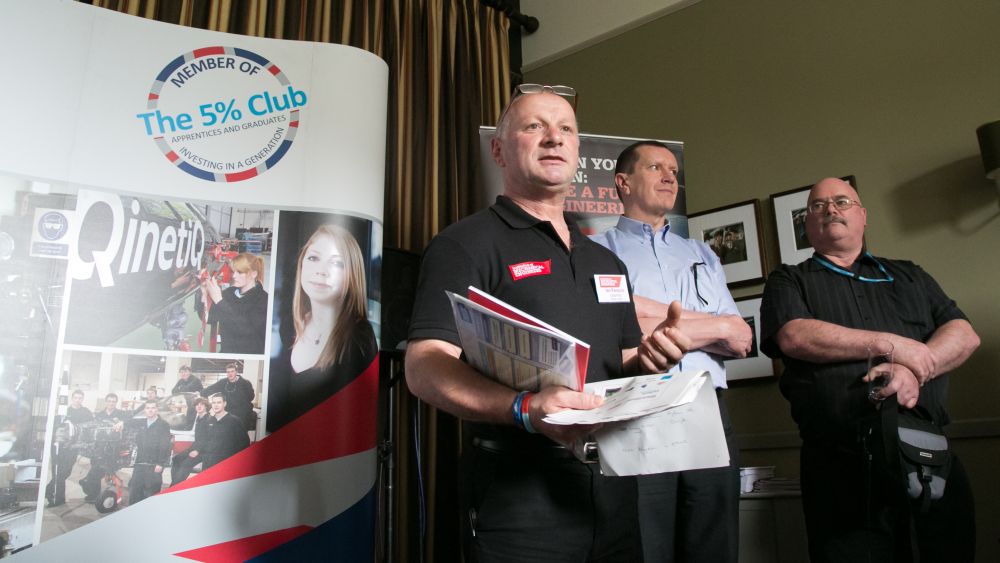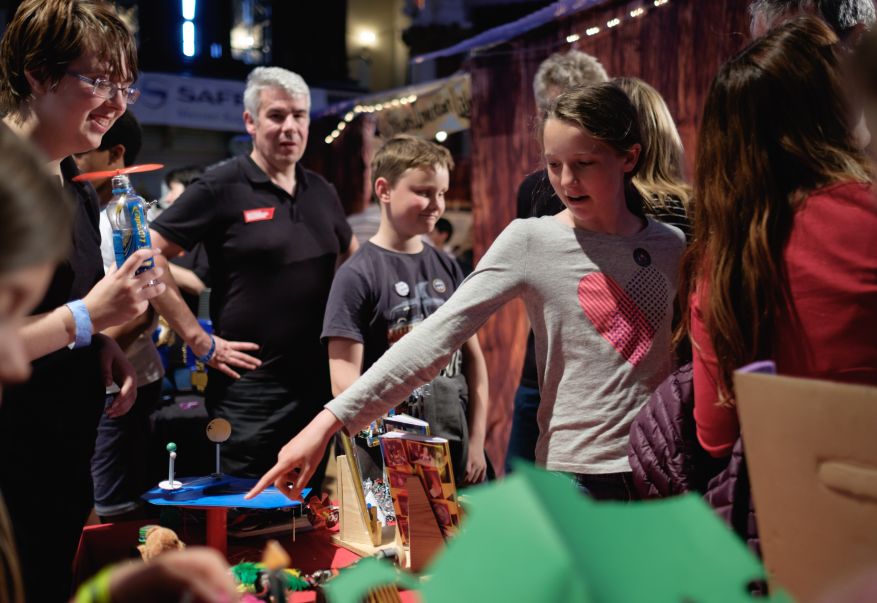Over the six days of the
Cheltenham Science Festival, a great number of engineers had the opportunity to engage with attendees of all ages to showcase the wide-ranging and exciting world of engineering.
Institution-led activities included:
- Workshops for Key Stage 3 students (aged 13-14) entitled ‘Space – how far can you go?'.
- An activity stand offering fun engineering challenges.
- A teacher conference, attended by local heads of science and industry representatives.
Ian Parsons, Chair, Western Region, particularly commended Chris Ward, a student on an industrial placement at EDF Energy, who co-ordinated the input of seven fellow students for the ‘Space – How far can you go?' workshop.
Ian said: “Chris deserves high praise for leading the team in delivering an exciting, topical and engaging activity. EDF is a great supporter of engineers in the Region and the EDF group created sessions which sparked the imagination.”
Chris said: “The aim was to influence students’ GCSE choices to include maths and science so that they have the option of progressing towards a career in engineering.
"Our three 90-minute workshops challenged participants’ skills in communication, attention to detail, creativity, logical thinking, problem solving and teamwork. Running the workshops was also a fantastic development opportunity for all of us.”
Caroline Britten, Head of Science at Bredon School, said: “This style of engagement – hands-on activities – is ideal for our students, many of whom are kinaesthetic learners. I am sure many of our cohort are destined for science and engineering apprenticeships.”

Volunteers on the Institution's popular stand included STEM Ambassadors, Bloodhound Ambassadors and Western Region volunteers. Rob Bates from Defence Equipment and Support (DE&S), a member of the Institution of Engineering and Technology (IET) , coordinated the six days of fun engineering activities.
He was supported by Helen Rich, the Institution's Vice Chair Gloucester Area Committee, Chris Roberts of NOV Downhole and a great number of Institution and IET engineers from companies such as Atkins, Renishaw and Rolls-Royce. There were proportionally more female STEM Ambassadors on the stand, providing positive role models for young women and girls.
Recent winner of the Institution's Alastair Graham-Bryce Award, Caroline Alliston – whose company
Technology for Fun often works closely with the Western Region – entertained children with motorised brushes and tools, and on Saturday great numbers took part in a mass ‘make-and-do’ workshop creating balloon cars and rockets.
Graham Jeffery, a Bloodhound Ambassador working on the stand, said: “Many young people are lacking in experience of the ‘real world’, such as mechanical toys or bike maintenance. My particular passion is in the promotion of hands-on, design-and-make experiences to students to counteract the so-called ‘Nintendo culture’.”

Ian Parsons led the inaugural Teacher Conference for 25 secondary heads of science from local schools. It was an informal information and networking session for educators and industry; the culmination of a Gloucestershire Teachers’ Training Day.
Ian, who organised and introduced the informal event in partnership with the Festival, spoke about the role of the Institution in setting the national agenda, and highlighted the need for greater effective partnerships between education and industry to address the engineering skills gap.
To this end, Ian, his fellow presenters and the delegates discussed approaches including the
Teacher Industrial Partners’ Scheme (TIPS); the
5% Club; and the benefits of modern engineering apprenticeship schemes.
Ian was supported by:
- Ian Beresford, Capability Director, QinetiQ
- Harriet Langdale, South of England Regional Director, Primary Engineer
- Caroline Alliston, Technology for Fun
- Bernadette Christmas, HR Manager, Xylem Water Services Ltd
- Gary Miller, Training & Development Manager, Delphi Diesel Systems Ltd
Hayley Barnden, an Institution volunteer and MoD apprentice, worked on the stand and also spoke about her training and future at the Teacher Conference.
Ian Parsons commented: “Xylem and Delphi run Institution-accredited graduate and apprentice schemes, offering great opportunities for local young people. Company representatives discussed engaging with local schools for STEM support for delivery of the curriculum and careers guidance - especially apprenticeships and potential industrial visits - suggestions which were very positively received.”
The Institution contributed £300 to the costs of the space workshops. EDF kindly granted the students volunteering time and loaned professional equipment, while the University of Bristol’s
ChemLabS also kindly loaned equipment.